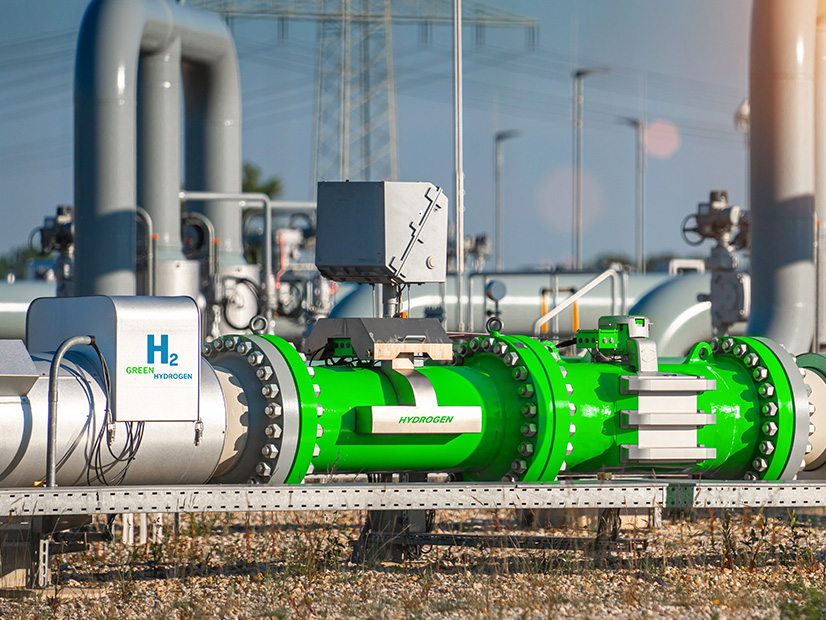
A group pressing Massachusetts’ transition to carbon-free fuels is trying to head off consideration of hydrogen as a wide-scale replacement for natural gas.
Producing green hydrogen in quantities sufficient to supply all the structures now heated with gas would consume all the clean electricity that offshore wind is projected to supply to Massachusetts, according to a report released Monday by Gas Transition Allies, a coalition of more than two dozen organizations, advocates and researchers.
Decarbonizing the power grid and ramping up green hydrogen production would be impossible to do simultaneously by 2050 or even longer, the report concludes.
The report is the latest dispatch in an ongoing competition between environmental advocates and natural gas delivery companies to shape policy and opinion as Massachusetts moves to a net-zero future.
The Massachusetts Department of Public Utilities has drawn comments from all sides of the debate in its investigation (20-80) of the role of natural gas local distribution companies as the state moves toward its 2050 climate goals.
Green hydrogen is the subject of research and development on multiple fronts. It holds promise because it does not produce greenhouse gas emissions when burned, but the cost of production currently is not economical for many purposes.
Also, if the electricity used to produce hydrogen is generated by burning fossil fuels, the climate-protection benefit of hydrogen produced is negated.
This is at the heart of the new report, “Impact of Green Hydrogen Production on the Availability of Clean Electricity for the Grid.”
Key points include:
- 3.2 GW of offshore wind capacity is predicted to be available for Massachusetts by 2030.
- Replacing 100% of natural gas in all Massachusetts structures that now use it as a heating fuel with an 80/20 blend of natural gas and green hydrogen would require 3.9 GW of nameplate offshore wind capacity.
- An 80/20 blend would result in only a small emissions reduction that falls far short of state mandates.
- Replacing natural gas with 100% green hydrogen would require 19.7 GW of offshore wind power, plus an enormous expenditure on hydrogen-compatible equipment and infrastructure.
- Electric heat pumps are a better option — 3.7 times more efficient than hydrogen boilers.
The report bases its calculations on a series of assumptions about the power output of offshore wind turbines and power demand of hydrogen electrolyzers. Some of the data points will likely improve, given the amount of effort being poured into research and development.
For example, the report assumes 43 kWh of electricity will be needed to produce 1 kg of hydrogen, which is low by current standards. But the U.S. Department of Energy in 2021 launched one of its Energy Earthshots, seeking to cut the cost of clean hydrogen production by 80%.
‘Inherent Flexibility’
Two of the natural gas LDCs that will be directly affected by Massachusetts policy decisions told NetZero Insider on Monday they continue to see hydrogen as a potential path to net zero.
Unitil (NYSE:UTL) spokesperson Alec O’Meara said the company was still reviewing the report. He added:
“Regarding hydrogen in general, we very much believe fully endorsing or ruling out any one specific energy solution would be premature at this time. Unitil is a firm supporter of the commonwealth’s stated emission goals, and as a company we are continuing to explore the potential of a wide number of different renewable natural gas options, including hydrogen.”
National Grid (NYSE:NGG) spokesperson Christine Milligan said the company is firmly committed to its net-zero goal, pursuing it through energy-efficiency programs, offshore wind, EV charging programs and, eventually, hydrogen.
“Green hydrogen is currently being demonstrated around the world as a renewable carrier and a means for long-term storage of renewable power. Its inherent flexibility means it can be used synergistically with solar and wind and, if used for heating, might reduce the potential for renewable power curtailments like those seen already in California,” she said.
“With billions of dollars in federal support for clean hydrogen coming through the IRA [Inflation Reduction Act] and IIJA [Infrastructure Investment and Jobs Act], green hydrogen is going to get much more affordable and more abundant in coming decades. We feel it can play a very important role in helping meet our decarbonization goals and has a range of use cases.”
‘Not Well-suited’ for Local Distribution
Other proponents and opponents of green hydrogen have made their points regularly, in Massachusetts and elsewhere.
At a recent press briefing, environmental advocates decried the possible use of hydrogen in New England, calling it inefficient, explosive and leak-prone.
“There are roles for hydrogen, in hard to decarbonize sectors,” said Steven Hamburg, chief scientist at the Environmental Defense Fund. “But hydrogen is not well-suited for thinking about applications in an urban environment for local distribution-related services like what we do with natural gas.”
“If we just keep going with the status quo, with gas utilities continuing to pretend there’s a path to keep the pipes running indefinitely, we’re going to have a utility death spiral where people who can afford to leave the system do. People who can’t leave … are going to be stuck holding the bag and paying ever higher costs,” said Caitlin Peale Sloan, a vice president at the Conservation Law Foundation.
At a recent meeting, ISO-NE board chair Cheryl LaFleur questioned the wisdom of replacing gas systems with hydrogen.
“As far as hydrogen as a complete substitute for gas … that’s a much more expensive system to retrofit than to retrofit the lines to power plants,” LaFleur said.

